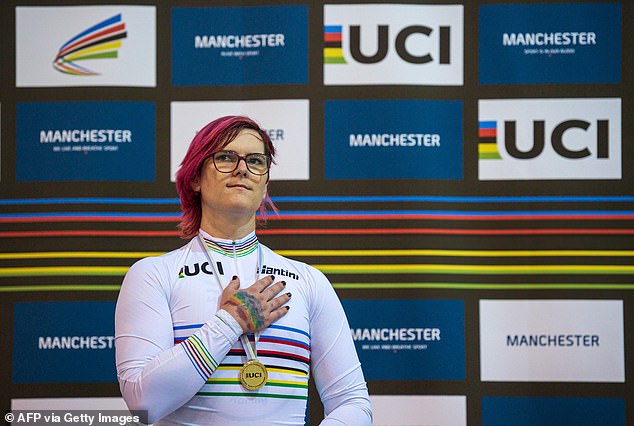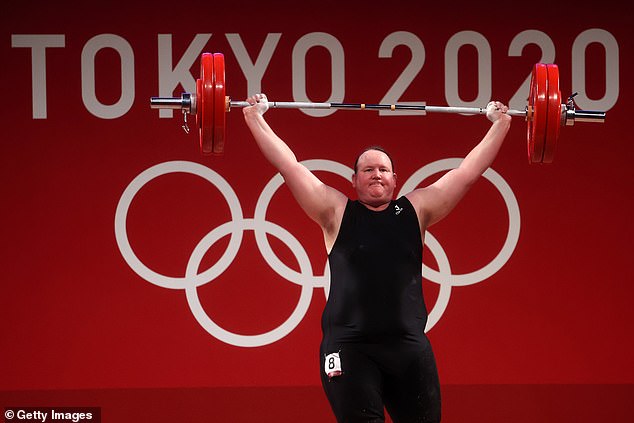The HUGE number of medals female athletes have lost to trans opponents allowed to compete against them is revealed in UN report highlighting women’s ‘loss of fair opportunity’
A United Nations report has revealed the staggering number of medals female athletes have lost to trans opponents.
The study – titled ‘Violence against women and girls in sport’ – stated that ‘policies implemented by international federations and national governing bodies’ had allowed male-born athletes to compete in women’s sporting categories.
It is then argued that athletes born male had gender-specific characteristics, such as higher strength, which were advantageous in certain sports and resulted in the ‘loss of fair opportunity’ for biologically female competitors.
Reem Alsalem, the UN Special Rapporteur on violence against women and girls, presented the findings of her report to the UN General Assembly earlier this month.
And this included the incredibly high number of biologically female athletes who had lost medals to transgender athletes.
American swimmer Lia Thomas, the first transgender athlete to win the highest U.S. national college title when she swam for the University of Pennsylvania in 2022.

Transgender athletes who have won gold medals in sporting events include Canadian cyclist Veronica Ivy, who became the first transgender cycling champion when she won gold at the UCI Women’s Masters Track World Championships
It showed that more than 600 female athletes had lost more than 890 medals in 29 sports.
The newspaper did not elaborate on which sporting events the medals were won, or in what time frame.
Transgender athletes who have won gold medals in sporting events include Canadian cyclist Veronica Ivy, who became the first transgender cycling champion when she won gold at the UCI Women’s Masters Track World Championships.
Another transgender athlete is American swimmer Lia Thomas, who became the first transgender athlete to win the highest U.S. national college title when she swam for the University of Pennsylvania in 2022.
Ms. Alsalem, an official from Jordan, goes on to say that some sports federations prescribe testosterone suppression to athletes to help them compete. However, she claims that this approach may only harm the athletes’ health, but also retain some ‘performance benefits’ in certain sports.
The New York Post reported that Ms Alsalem has also called on the UN to provide stronger protections for women and girls in sport.
In addition to transgender issues, Ms. Alsalem also argued that women face other obstacles in sports. This includes social stereotypes, widespread sexism and limited access to training facilities.
She said: ‘Women and girls already face many opportunities that hinder their equal and effective participation in sport.
“Furthermore, their ability to play sports in conditions of safety, dignity and fairness has been further eroded by the intrusion of men who identify as women into women-only sports and related spaces.”

New Zealand weightlifter Laurel Hubbard (pictured) became the first openly transgender athlete to compete in the Olympics when she debuted at Tokyo 2020
During the Paris Olympics, women’s boxing around Algerian boxer Imane Khelif was engulfed by a major row over gender suitability.
Ms. Khelif, who is biologically female and does not identify as transgender, went on to win a gold medal in women’s boxing, but her path to the podium was bumpy and full of controversy.
Before the Olympics, she failed two gender aptitude tests administered by the International Boxing Association (IBA). However, Olympic officials – who no longer recognize the IBA – dismissed it as “illegal” and defended its participation.
This did not stop a row erupting over Ms Khelif’s participation, with celebrities including JK Rowling and female boxers opposing her continued participation in the tournament.
When she won the gold medal – beating China’s Yang Liu – she said: ‘I am fully qualified to participate in this competition. I am a woman like any other woman. I was born a woman, I lived as a woman, I participated as a woman, there is no doubt about that.”
A handful of transgender men and women competed at the Paris Olympics this summer, but some, like New Zealand weightlifter Laurel Hubbard, who became the first openly transgender athlete to compete at the Olympics when she debuted at Tokyo 2020, did not participate this year.
